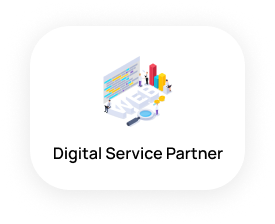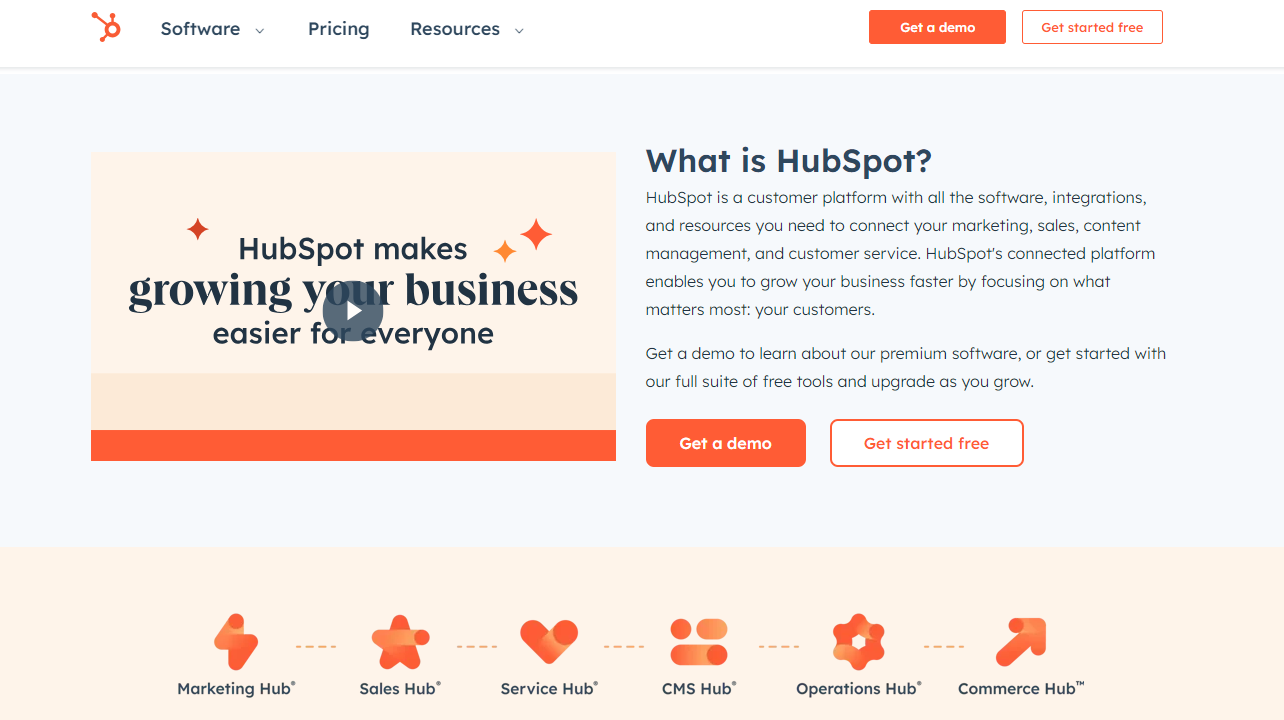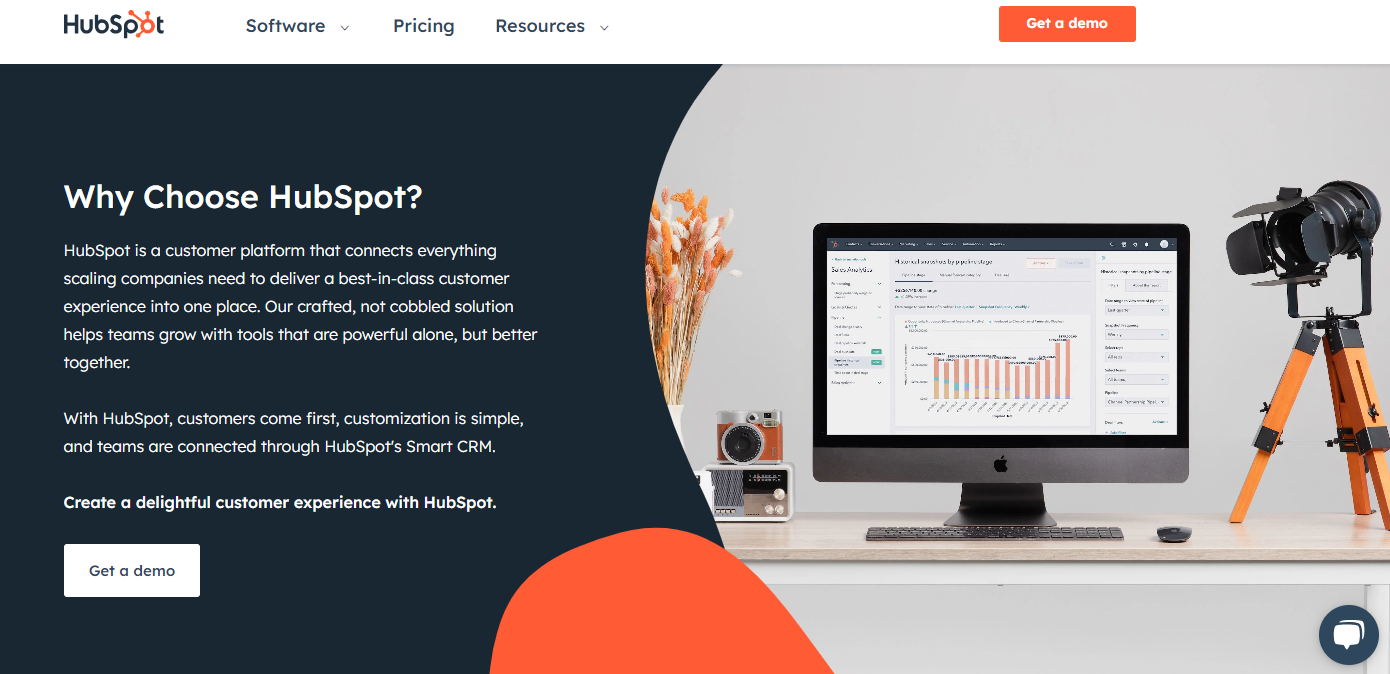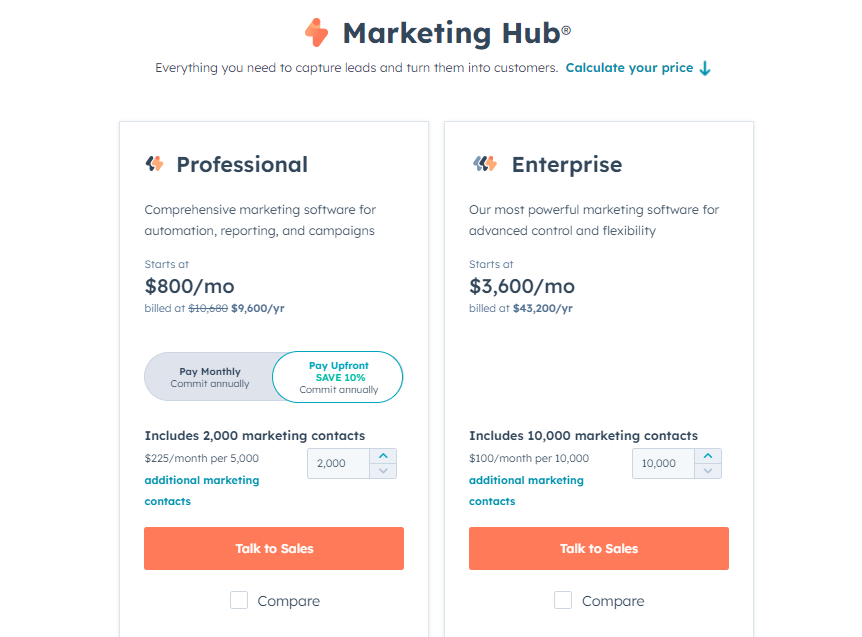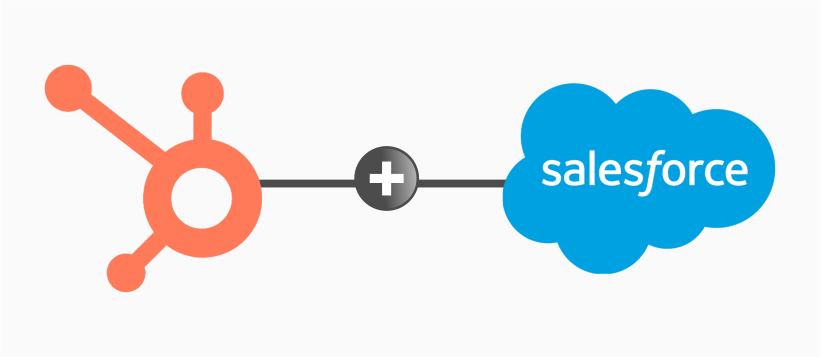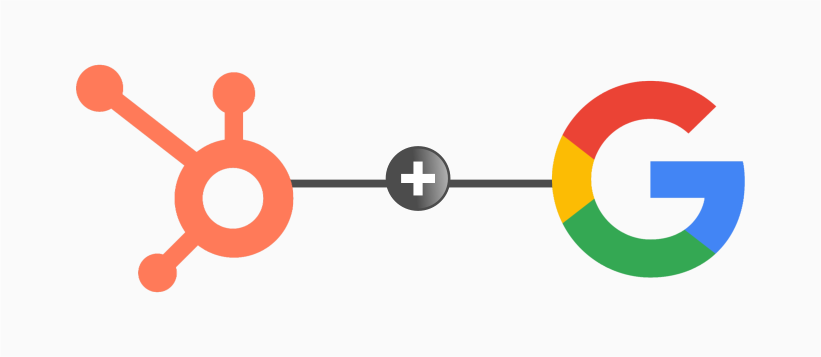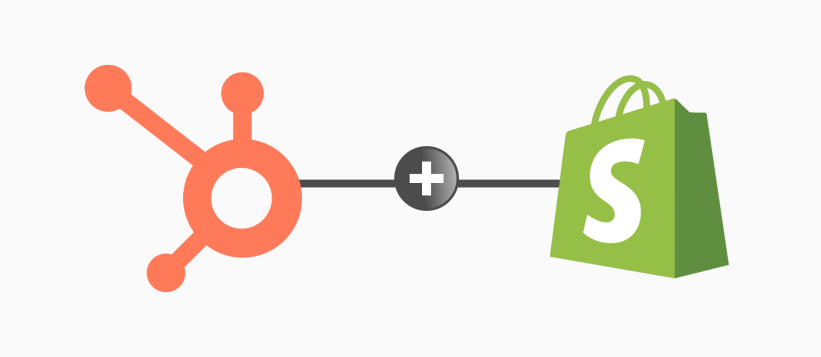How HubSpot Can Help Your Business
HubSpot is more than just a software platform; it’s a comprehensive solution designed to empower businesses in the digital age. With its wide array of tools, HubSpot simplifies and optimises critical business functions. Whether you’re a startup looking to make a mark or an established enterprise seeking growth, HubSpot can help you achieve your goals. In this blog post, we’ll dive deep into what HubSpot is, its core features, and how it has become a cornerstone in the business world.
What is HubSpot?
HubSpot is a comprehensive inbound marketing, sales, and customer service platform that provides a suite of tools and services designed to help businesses attract, engage, and delight customers. It was founded in 2006 and has since become a prominent player in the software-as-a-service (SaaS) industry.
HubSpot’s primary goal is to assist businesses in growing their online presence, generating leads, converting those leads into customers, and providing excellent customer service.
Key aspects of what HubSpot is and what it offers include:
- Customer Relationship Management (CRM): HubSpot provides a user-friendly CRM system that allows businesses to organise and manage their contacts, track interactions, and gain insights into customer behaviour.
- Marketing Automation: HubSpot’s marketing tools enable businesses to create, automate, and analyse marketing campaigns. This includes email marketing, social media management, content marketing, and SEO optimisation.
- Sales Automation: For sales teams, HubSpot offers sales automation features like lead management, email tracking, and sales analytics. These tools help streamline the sales process and improve efficiency.
- Content Management: HubSpot’s content management system (CMS) allows businesses to create and manage their website content, blog posts, landing pages, and more. It offers tools for content creation, optimisation, and scheduling.
- Customer Service Tools: HubSpot provides customer service solutions, including ticketing, knowledge base creation, live chat, and customer feedback management. These tools enhance customer support and satisfaction.
- Analytics and Reporting: HubSpot offers robust analytics and reporting capabilities that provide valuable insights into marketing, sales, and customer service performance. Users can track key metrics and make data-driven decisions.
- Integration: HubSpot can integrate with various third-party software and tools, allowing businesses to connect their existing systems seamlessly. This integration capability ensures a unified workflow.
- Education and Training: HubSpot provides a wealth of educational resources, including courses, certifications, webinars, and a thriving community of users and experts. These resources empower users to make the most of the platform.
- Customisation: HubSpot allows businesses to customise their marketing and sales processes to fit their unique needs. It’s scalable and adaptable to businesses of all sizes, from startups to large enterprises.
- User-Friendly Interface: One of HubSpot’s strengths is its intuitive and user-friendly interface, making it accessible to users with varying levels of technical expertise.
Benefits of HubSpot for Businesses
HubSpot offers a wide range of benefits for businesses across various industries and sizes. Here are some of the key benefits of using HubSpot for your business:
1. Streamlined Marketing Effort
- All-in-One Marketing Platform: HubSpot provides a comprehensive suite of marketing tools, including email marketing, social media management, content creation, SEO optimisation, and analytics, all within one platform. This streamlines marketing efforts by eliminating the need for multiple, disconnected tools.
- Marketing Automation: HubSpot’s automation features allow you to create and schedule marketing campaigns, segment your audience, and personalise content. Automation saves time and ensures consistency in your marketing efforts.
- Lead Generation: HubSpot helps businesses attract and capture leads through lead forms, landing pages, and call-to-action buttons. It also provides lead scoring to prioritise and nurture leads effectively.
2. Enhanced Sales Processes
- CRM Integration: HubSpot’s CRM system integrates seamlessly with its marketing and sales tools. This allows sales teams to manage leads, track interactions, and gain insights into lead behavior.
- Sales Automation: HubSpot automates repetitive sales tasks, such as sending follow-up emails, scheduling appointments, and tracking email opens and clicks. This improves efficiency and enables sales teams to focus on high-value activities.
- Pipeline Management: The platform offers tools for managing sales pipelines, tracking deals, and forecasting revenue. This helps businesses gain visibility into their sales process and make informed decisions.
3. Effective Customer Service
- Customer Support Tools: HubSpot includes features like ticketing, live chat, knowledge base creation, and customer feedback management. These tools enhance customer service by providing multiple channels for support and self-help resources.
- Customer Insights: HubSpot’s CRM stores valuable customer data, enabling support teams to provide personalised assistance. This enhances customer satisfaction and builds stronger relationships.
4. Analytics and Reporting
- Data-Driven Decision Making: HubSpot offers robust analytics and reporting capabilities. Users can track key performance metrics, measure the ROI of marketing campaigns, and gain insights into customer behavior. This data allows businesses to make informed decisions and continuously improve their strategies.
5. Integration With Other Tools
- Third-Party Integrations: HubSpot can integrate with a wide range of third-party software and tools, including CRM systems, e-commerce platforms, analytics tools, and more. This flexibility allows businesses to connect their existing systems and create a unified workflow.
6. Scalability and Customisation
- Scalable Solutions: HubSpot caters to businesses of all sizes, from startups to enterprises. It offers different pricing tiers and features to accommodate various needs and budgets.
- Customisation: Businesses can customise their marketing, sales, and customer service processes within HubSpot to align with their unique requirements. This ensures that the platform adapts to the specific needs of each business.
7. Education and Training
- Educational Resources: HubSpot provides a wealth of educational resources, including courses, certifications, webinars, and a vibrant user community. These resources empower users to maximise the platform’s capabilities and stay up-to-date with industry trends.
8. User-Friendly Interface
- Intuitive Design: HubSpot is known for its user-friendly interface, making it accessible to users with varying levels of technical expertise. This ease of use reduces the learning curve for new users and encourages adoption within organisations.
HubSpot Pricing
Understanding HubSpot’s pricing structure is crucial for informed decisions. HubSpot offers various tiers:
- Free: No cost. Basic CRM, Email Marketing, Forms, Live Chat, and Reporting. Ideal for startups.
- Starter: Monthly cost. Adds Email Marketing Automation, Ad Management, Landing Pages, and Enhanced Reporting. Suitable for small businesses.
- Professional: Higher monthly cost. Advanced Marketing Automation, CRM Customisation, A/B Testing, Blog Tools, and SEO Optimisation. Best for growing businesses.
- Enterprise: Highest tier. Advanced Reporting, Predictive Scoring, Custom Event Triggers, and Multi-Touch Revenue Attribution. Designed for large enterprises.
HubSpot’s pricing depends on contacts, additional features, and support. Assess your needs, and budget, and try a 30-day free trial to make the right choice.
Integration With Other Tools
HubSpot’s strength lies in its seamless integration with a wide range of business software, enhancing its utility and flexibility. These integrations offer several benefits, such as data synchronisation, process automation, and streamlined operations. Here’s an overview of HubSpot’s integration capabilities and the popular tools it can connect with:
1. Salesforce Integration
- HubSpot integrates seamlessly with Salesforce, one of the leading CRM platforms.
- This integration ensures that your sales and marketing teams have access to up-to-date customer data and can collaborate effectively.
- It also allows for the synchronisation of leads, contacts, and opportunities between HubSpot and Salesforce, ensuring data consistency.
2. Google Workspace (formerly G Suite) Integration
- HubSpot can integrate with Google Workspace, including Gmail and Google Calendar.
- This integration enables you to track email opens, clicks, and meetings within HubSpot, providing valuable insights into prospect and customer interactions.
- You can also schedule meetings directly from HubSpot, enhancing productivity and scheduling efficiency.
3. Shopify Integration
- For e-commerce businesses, HubSpot offers integration with Shopify.
- This integration helps you manage customer data, track online store activity, and personalise marketing efforts.
- You can segment customers based on their shopping behaviour and target them with relevant content and offers.
4. Other Integrations
- HubSpot’s integration marketplace features a vast array of connectors for popular business tools, such as Mailchimp, Slack, Trello, and many more.
- These integrations allow you to sync data, automate repetitive tasks, and create efficient workflows.
Benefits of Integration
- Efficiency: Integrating HubSpot with your preferred tools reduces manual data entry and automates routine processes, saving time and reducing errors.
- Data Consistency: Integrations ensure that customer data remains consistent across platforms, enhancing the accuracy of your records.
- Improved Collaboration: Seamless data sharing between sales, marketing, and customer service teams fosters better collaboration and alignment.
- Enhanced Personalisation: Integrations enable you to gather and use data from various sources to create highly personalised marketing and sales strategies.
- Comprehensive Insights: By consolidating data from multiple tools, you gain a holistic view of customer interactions and can make more informed decisions.
Tips for Getting Started with HubSpot
If you’re ready to harness the power of HubSpot for your business, here’s a step-by-step guide to get you started:
- Sign up for HubSpot and choose the appropriate pricing tier.
- Set up your account and customise your dashboard.
- Import your existing contacts and data into HubSpot.
- Create and automate marketing campaigns.
- Implement CRM and sales automation for lead management.
- Utilise customer service tools to enhance support.
- Train your team and leverage HubSpot’s extensive educational resources.
- Continuously monitor and analyse performance to optimise your strategies.
Additionally, consider these best practices and recommendations to maximise your HubSpot experience.
Work with Us
If you’re eager to discover the immense benefits of HubSpot for your business, look no further than Ubique Digital Solutions. As a trusted HubSpot partner, we specialize in guiding businesses through the benefits of HubSpot, whether it’s streamlining marketing efforts, boosting customer engagement, or optimizing sales processes. Contact us today to learn more!
FAQs
Q: Is HubSpot Suitable for Small Businesses?
Yes, HubSpot offers solutions tailored to the needs of small businesses, making it an excellent choice for startups and SMEs.
Q: Can I Use HubSpot for E-commerce?
Absolutely! HubSpot’s integration with e-commerce platforms allows businesses to manage online stores, track customer behavior, and optimise sales processes.
Q: What Is the Pricing Range for HubSpot?
HubSpot pricing varies depending on the chosen plan. The Free tier is available at no cost, while paid plans range from Starter to Enterprise, with pricing corresponding to the features and scale required.
Q: Does HubSpot Provide Training and Support?
Yes, HubSpot offers extensive training resources, including courses and certifications. They also provide customer support to assist with any queries or issues.
Q: Can HubSpot Help With Content Marketing?
Absolutely. HubSpot’s content management and marketing automation tools are well-suited for content marketing, allowing businesses to create, distribute, and analyze content effectively.


